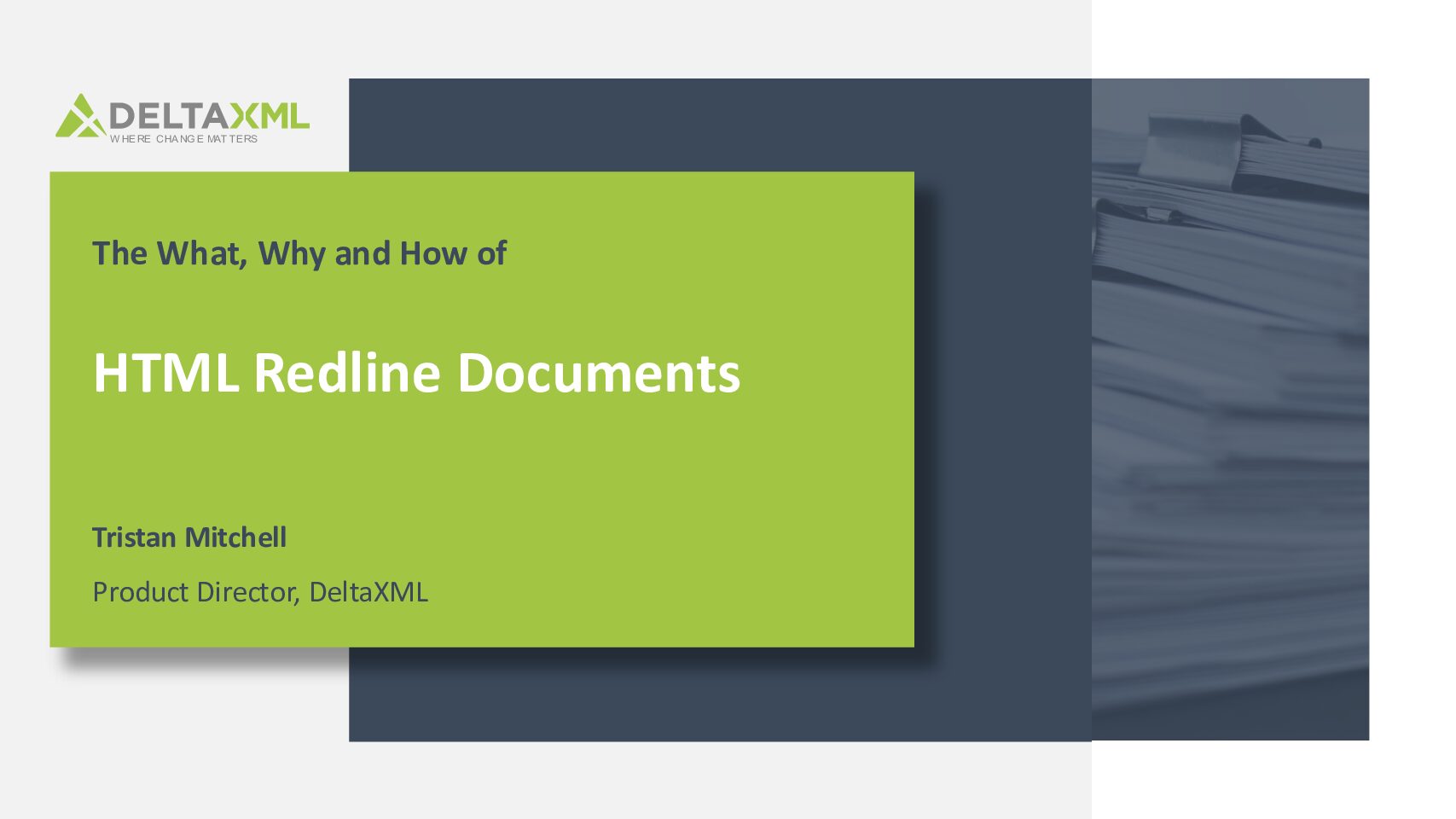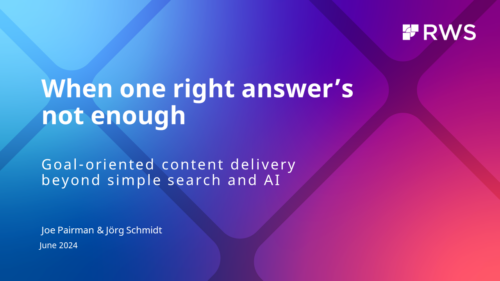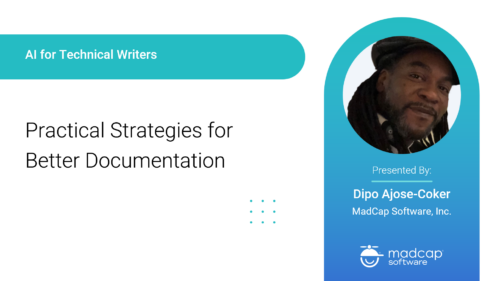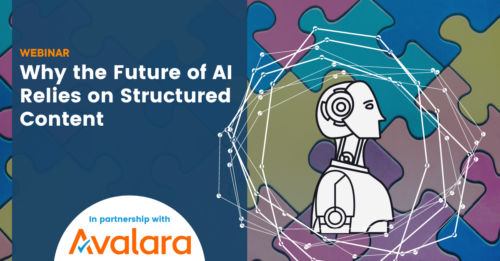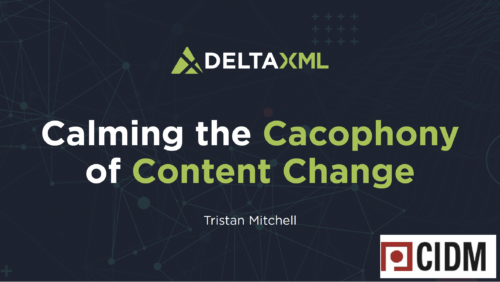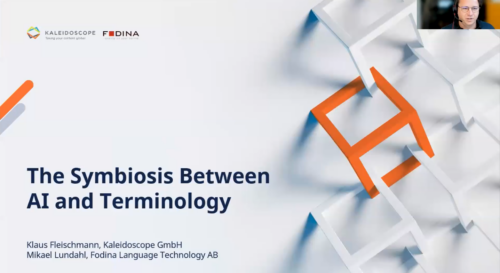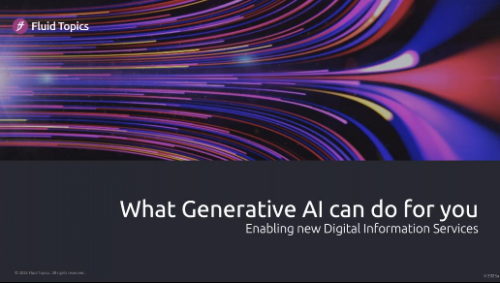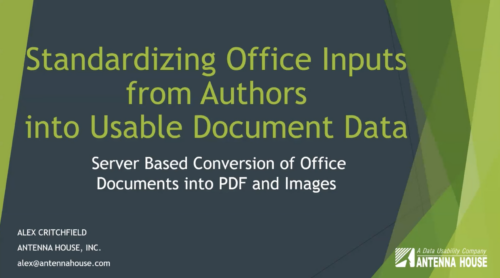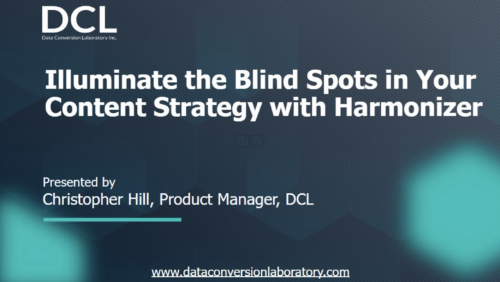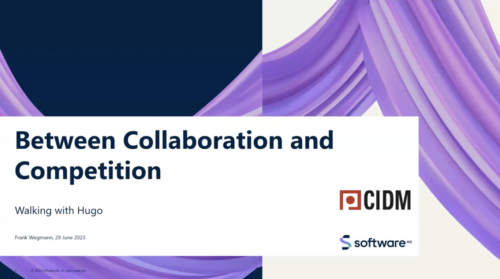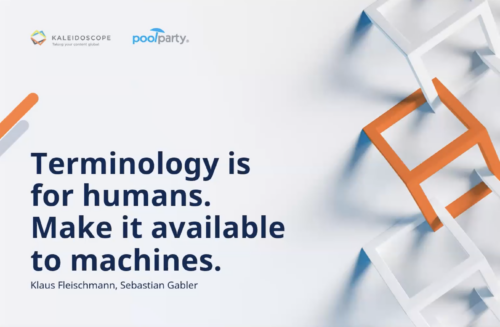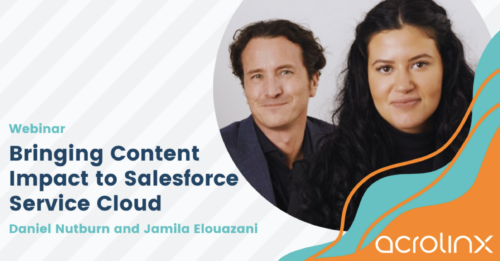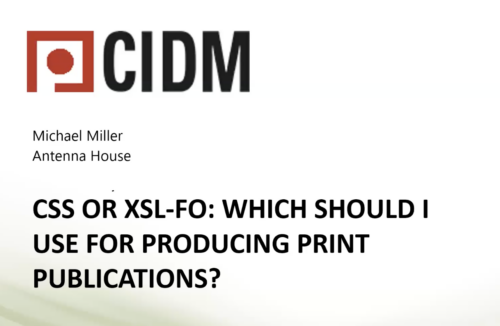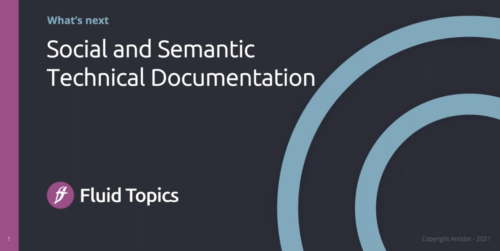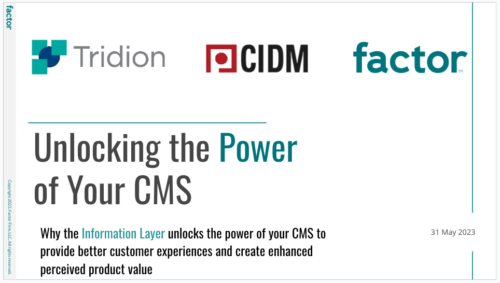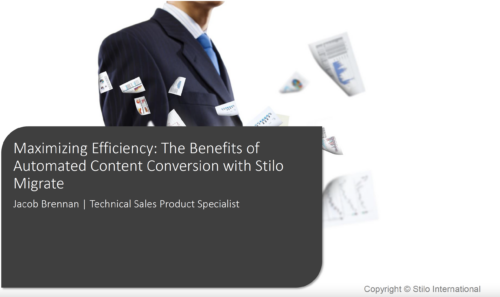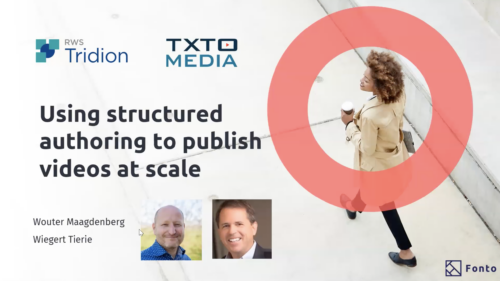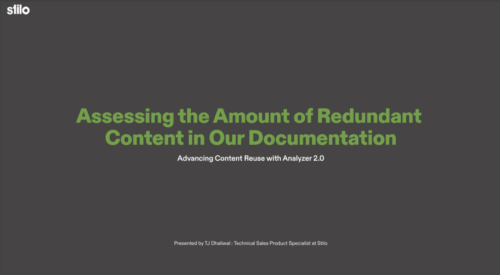-
Recorded on October 16, 2024
 HTML is used not only as a final delivery format but increasingly as the source format for documentation of all kinds, whether that’s internal product designs or customer-focused technical documentation. Understanding change in those documents is a vital part of your content management workflow.
Join us as we explore the ins and outs of HTML redline documents, looking at how to identify change in HTML, how to visualise it, and how it fits into your toolkit. From text to tables, MathML to SVG, come and discover how to decide what matters in your redline output.
Presented by: Tristan Mitchell, DeltaXML
HTML is used not only as a final delivery format but increasingly as the source format for documentation of all kinds, whether that’s internal product designs or customer-focused technical documentation. Understanding change in those documents is a vital part of your content management workflow.
Join us as we explore the ins and outs of HTML redline documents, looking at how to identify change in HTML, how to visualise it, and how it fits into your toolkit. From text to tables, MathML to SVG, come and discover how to decide what matters in your redline output.
Presented by: Tristan Mitchell, DeltaXML
 Tristan is Product Director at DeltaXML, a technology company with world-leading software products for managing change in structured content. He has a deep understanding of DeltaXML’s product suite and loves to help customers create extra value in their content using change management. Tristan is a father to three daughters, a movie lover, and a keen runner.
Tristan is Product Director at DeltaXML, a technology company with world-leading software products for managing change in structured content. He has a deep understanding of DeltaXML’s product suite and loves to help customers create extra value in their content using change management. Tristan is a father to three daughters, a movie lover, and a keen runner.
-
Recorded on October 9, 2024
 The way you deliver content impacts every aspect of your business, from how users discover and engage with your information to the speed of your product launch and the quality of your customer support. The success of both your content and product hinges on how effectively you manage this process.
In today’s AI-driven world, Content Delivery Platforms (CDPs) are a game-changer. By unifying and centralizing all your knowledge, they serve as an essential backbone for Generative AI applications while empowering companies to deliver relevant, personalized and contextual content experiences to users on any device and at any touchpoint.
Join our masterclass to uncover the key concepts, benefits, and practical uses of a CDP, illustrated with real-world examples from diverse industries and businesses. Discover how to choose the right solution to meet your current delivery needs and future-proof your business for long-term success.
Presented by Fabrice Lacroix
The way you deliver content impacts every aspect of your business, from how users discover and engage with your information to the speed of your product launch and the quality of your customer support. The success of both your content and product hinges on how effectively you manage this process.
In today’s AI-driven world, Content Delivery Platforms (CDPs) are a game-changer. By unifying and centralizing all your knowledge, they serve as an essential backbone for Generative AI applications while empowering companies to deliver relevant, personalized and contextual content experiences to users on any device and at any touchpoint.
Join our masterclass to uncover the key concepts, benefits, and practical uses of a CDP, illustrated with real-world examples from diverse industries and businesses. Discover how to choose the right solution to meet your current delivery needs and future-proof your business for long-term success.
Presented by Fabrice Lacroix
 Fabrice Lacroix is a serial entrepreneur and a technology pioneer. He has been working for 25 years on the development of innovative solutions around search technology, content enrichment and AI. He is the founder of Fluid Topics, the leading Content Delivery Platform that reinvents how users search, read and interact with technical documentation.
Fabrice Lacroix is a serial entrepreneur and a technology pioneer. He has been working for 25 years on the development of innovative solutions around search technology, content enrichment and AI. He is the founder of Fluid Topics, the leading Content Delivery Platform that reinvents how users search, read and interact with technical documentation. -
Recorded on August 28, 2024
 Join us for a fireside chat featuring industry leader, Laura Bellamy and Acrolinx VP of Strategy, Paul Bongers. During this webinar, Paul and Laura will discuss a data-driven content approach to ensure great customer experiences, including:Presented by: Paul Bongers, Acrolinx and Laura Bellamy
Join us for a fireside chat featuring industry leader, Laura Bellamy and Acrolinx VP of Strategy, Paul Bongers. During this webinar, Paul and Laura will discuss a data-driven content approach to ensure great customer experiences, including:Presented by: Paul Bongers, Acrolinx and Laura Bellamy- How a data-driven approach supports content quality initiatives in the enterprise.
- How AI is changing the way organizations look at content quality.
- The impact of AI in the content supply chain.
 Paul Bongers, VP StrategyPaul shapes the Acrolinx product strategy. He's worn many hats in SaaS businesses, but at heart he's a strategist and a technologist. Paul brings a wealth of experience and creativity to Acrolinx. His work with partner ecosystem development, SaaS strategy development along with a deep passion for user-centric technology set the tone of innovation at Acrolinx.
Paul Bongers, VP StrategyPaul shapes the Acrolinx product strategy. He's worn many hats in SaaS businesses, but at heart he's a strategist and a technologist. Paul brings a wealth of experience and creativity to Acrolinx. His work with partner ecosystem development, SaaS strategy development along with a deep passion for user-centric technology set the tone of innovation at Acrolinx. Laura Bellamy, Director of Content Insights and Quality
[email protected]
Laura has 20+ years of experience in the content and customer experience industry where she brings a forward-thinking mindset to help teams adapt and grow. She has been recognized for award-winning user-centered experiences and innovations. Formerly at AWS, she led the Content Insights & Quality to establish evidence-based standards for content quality and performance. Prior to Amazon, she led Content Strategy and Information Experience for VMware and served as an information architect for IBM. She is a co-author of the book DITA Best Practices: A Roadmap for Writing, Editing, and Architecting in DITA.
Laura Bellamy, Director of Content Insights and Quality
[email protected]
Laura has 20+ years of experience in the content and customer experience industry where she brings a forward-thinking mindset to help teams adapt and grow. She has been recognized for award-winning user-centered experiences and innovations. Formerly at AWS, she led the Content Insights & Quality to establish evidence-based standards for content quality and performance. Prior to Amazon, she led Content Strategy and Information Experience for VMware and served as an information architect for IBM. She is a co-author of the book DITA Best Practices: A Roadmap for Writing, Editing, and Architecting in DITA.
-
Recorded on: August 21, 2024

Uncover the various ways to use a RAG solution with PoolParty and GraphDB
We’re familiar with RAG - but which RAG is the right fit? As organizations increasingly rely on AI-driven information retrieval and generation, traditional Retrieval Augmented Generation (RAG) systems often fall short in production environments. Various solutions have emerged to address this challenge, recognizing that “one size does not fit all” - each organization has unique requirements to tackle this issue within their framework. Increase efficiency by up to 20% with Semantic RAG (AKA Graph RAG)This webinar explores an innovative solution: Semantic RAG, which harnesses the power of knowledge graphs, large language models (LLMs), and graph databases to enhance semantic retrieval and generation capabilities.
A key focus will be on LLM-derived knowledge graphs, demonstrating how they can be created and refined with human-in-the-loop processes to achieve greater accuracy and explainability. We'll explore memory constructs in Graph RAG operations, illustrated through practical demonstrations using PoolParty and GraphDB.
We will dive into a real-world case study and explore the pipeline, architecture, and practical applications of Semantic RAG systems. This will showcase valuable insights into the seamless collaboration between PoolParty and GraphDB to deliver a robust Semantic RAG solution. Expert strategies will be shared for maximizing the impact of these innovative technologies by shortening time to insight, providing savvy querying for the untrained, and lowering long term maintenance costs.
Márcia Ferreira, Data and Knowledge Engineer (Technical Consultant) at Semantic Web Company, and Krasimira Bozhonova, Solutions Architect at Ontotext, will walk you through the following aspects and explain the benefits of a Semantic RAG approach:
-
Vector RAG vs. Graph RAG
-
Grounding LLMs with Graph
-
Conventional RAG vs. Semantic RAG
-
Different varieties of Graph RAG
-
Demo of PoolParty Semantic RAG and GraphDB
In the meantime, have a look at our Semantic Retrieval Augmented Generation page to learn more about the capabilities and benefits of utilizing Knowledge Graphs to power your Generative AI experience.
We hope to see you there!
Presented by: Márcia Ferreira, Semantic Web Company Márcia R. Ferreira is a Data and Knowledge Engineer (Technical Consultant) at Semantic Web Company. By implementing state-of-the-art semantic systems, Márcia ensures customers' data requirements are met at the highest level. She is interested in integrating LLMs with graph technologies for impactful applications in knowledge-intensive industries.
Krasimira Bozhanova, Ontotext
Márcia R. Ferreira is a Data and Knowledge Engineer (Technical Consultant) at Semantic Web Company. By implementing state-of-the-art semantic systems, Márcia ensures customers' data requirements are met at the highest level. She is interested in integrating LLMs with graph technologies for impactful applications in knowledge-intensive industries.
Krasimira Bozhanova, Ontotext
 Krasimira Bozhanova is a Solutions Architect at Ontotext, starting her way as a developer and contributing to many of the company's significant client projects. In recent years she has been a part of the AI in Action Ontotext initiative which puts Ontotext products at the heart of various AI applications.
Krasimira Bozhanova is a Solutions Architect at Ontotext, starting her way as a developer and contributing to many of the company's significant client projects. In recent years she has been a part of the AI in Action Ontotext initiative which puts Ontotext products at the heart of various AI applications. -
-
Recorded on: August 7, 2024

In this webinar, Dipo Ajose-Coker offers a step-by-step guide to understanding and implementing structured authoring and DITA, highlighting the benefits such as improved content reuse, consistency, and efficient multichannel publishing.
Structured authoring and DITA represent a strategic shift towards more efficient and effective content management. The session begins with an introduction to structured authoring and DITA, focusing on the benefits of this methodology, including enhanced content reuse, improved consistency across documentation, and streamlined localization processes.
Attendees will gain insights into the best practices for implementing structured authoring and DITA within their organizations, including tool selection, team training, and workflow design. The session also offers practical strategies for overcoming common challenges associated with implementing structured authoring and DITA.
In summary, participants will leave the session equipped with valuable insights and practical strategies to implement structured authoring and DITA for achieving greater content agility and operational efficiency:
- Introduction to structured authoring and DITA
- Benefits of structured authoring and DITA
- Best practices for implementing structured authoring and DITA, including tool selection, team training, and workflow design
- Strategies for overcoming common challenges associated with implementing structured authoring and DITA.
 After moving to France in 2005, Dipo earned an MA in Multilingual and Multimedia Document Conception from the Université Paris Cité. For the past 18 years, he has combined his language and IT skills, working as a DITA expert, technical writer, editor, and proof-reader in Fintech and MedTech. In 2021, Dipo transitioned to Content Creation and Marketing. As a vital intermediary, he bridges the gap between developers and end users, representing both perspectives. In the grand symphony of the Technical Communications industry, Dipo conducts, unifying and harmonizing the voices of users, industry experts and vendors.
After moving to France in 2005, Dipo earned an MA in Multilingual and Multimedia Document Conception from the Université Paris Cité. For the past 18 years, he has combined his language and IT skills, working as a DITA expert, technical writer, editor, and proof-reader in Fintech and MedTech. In 2021, Dipo transitioned to Content Creation and Marketing. As a vital intermediary, he bridges the gap between developers and end users, representing both perspectives. In the grand symphony of the Technical Communications industry, Dipo conducts, unifying and harmonizing the voices of users, industry experts and vendors.
-
Recorded on June 5, 2024

Delivery of tech docs often focuses on search — getting users to a good starting place. But users often have goals that a single page can’t cover. Serious tasks can require reference info, scenarios, and guidance. Users may need information in different media. Each user’s goal depends on their specific context, and they need to follow a unique path through the information. Writers cannot possibly design content for all of those users, with all of their unique paths.
Many of the ways that people have tried have failed. At various times, tech docs have relied more on search, or more on manual hyperlinks, or taxonomy. Pages have been long or short, other media have gone and come. Now AI offers easier ways to map content together, but even that’s not enough. Why?
Only a combination of techniques will give you the information model that you need. And the techniques on their own won’t get you all the way — you need an integrated design to bring your solution together. Learn how.
Key takeaways of this webinar will be: - The real needs of complex tasks for users, and how to map them to usable metadata. - What AI can do to suggest appropriate content — and what it can’t - How to design a suitable goal-enabling solution for your own organization’s needs
Join in with Joe Pairman, Director of Product Management, RWS Group and Jörg Schmidt, Senior Solutions Architect, RWS Group to find out more.
Presented by: Joe Pairman, Director of Product Management, RWS
Joe Pairman, Director of Product Management, RWS
Joe is Director of Product Management for Tridion. He is currently shaping strategic design for a more accessible and impactful product, drawing on his experiences leading teams and bringing structured content operations to tech companies, banks, and pharma companies.
 Jörg Schmidt, Senior Solutions Architect, RWS
Jörg has been working in multiple roles for different CCMS providers for more than 20 years. During that time, he has helped defining and implementing solutions in verticals like machinery, automotive, A&D - but also pharma & finance. Since 2013, he has been working for RWS as a Solution Architect.
Jörg Schmidt, Senior Solutions Architect, RWS
Jörg has been working in multiple roles for different CCMS providers for more than 20 years. During that time, he has helped defining and implementing solutions in verticals like machinery, automotive, A&D - but also pharma & finance. Since 2013, he has been working for RWS as a Solution Architect.
-
Recorded on June 12, 2024
 Much has been said about AI writing content, but what about reading it? What unique benefits does Generative AI provide for users to utilize and leverage your content? Actually, some of the most profitable GenAI use cases are related to the transformation of content delivery.
In this webinar, we will explore successful initiatives in GenAI-augmented Content Delivery, from search to reading experience, and personalized and automated question answering. We will showcase some examples of AI implementations in Fluid Topics’ content delivery platform, transforming product content and enterprise knowledge into exceptional user experiences.
Join Fabrice Lacroix, CEO of Fluid Topics, for an insightful session rooted in two decades of research and development in Large Language Models (LLM) and AI, along with recent AI projects within the industry.
Presented by Fabrice Lacroix
Much has been said about AI writing content, but what about reading it? What unique benefits does Generative AI provide for users to utilize and leverage your content? Actually, some of the most profitable GenAI use cases are related to the transformation of content delivery.
In this webinar, we will explore successful initiatives in GenAI-augmented Content Delivery, from search to reading experience, and personalized and automated question answering. We will showcase some examples of AI implementations in Fluid Topics’ content delivery platform, transforming product content and enterprise knowledge into exceptional user experiences.
Join Fabrice Lacroix, CEO of Fluid Topics, for an insightful session rooted in two decades of research and development in Large Language Models (LLM) and AI, along with recent AI projects within the industry.
Presented by Fabrice Lacroix
 Fabrice Lacroix is a serial entrepreneur and a technology pioneer. He has been working for 25 years on the development of innovative solutions around search technology, content enrichment and AI. He is the founder of Fluid Topics, the leading Content Delivery Platform that reinvents how users search, read and interact with technical documentation.
Fabrice Lacroix is a serial entrepreneur and a technology pioneer. He has been working for 25 years on the development of innovative solutions around search technology, content enrichment and AI. He is the founder of Fluid Topics, the leading Content Delivery Platform that reinvents how users search, read and interact with technical documentation. -
Recorded on June 5, 2024

Crafted for technical writers, savvy documentation managers, and stakeholders looking to innovate, this webinar aims to dissect how AI is reshaping the creation, management, and delivery of technical content. Attendees will learn how to leverage AI for more than just efficiency, with a focus on enriching content quality, enhancing user engagement, and informing content strategy with data-driven insights. Join Dipo as he encourages participants to delve into the optimal positioning of AI as a fundamental component of their technical communication toolkit, with the ultimate goal of redefining the boundaries of technical writing and documentation management.
Presented by: Dipo Ajose-Coker, MadCap Software After moving to France in 2005, Dipo earned an MA in Multilingual and Multimedia Document Conception from the Université Paris Cité. For the past 18 years, he has combined his language and IT skills, working as a DITA expert, technical writer, editor, and proof-reader in Fintech and MedTech. In 2021, Dipo transitioned to Content Creation and Marketing. As a vital intermediary, he bridges the gap between developers and end users, representing both perspectives. In the grand symphony of the Technical Communications industry, Dipo conducts, unifying and harmonizing the voices of users, industry experts and vendors.
After moving to France in 2005, Dipo earned an MA in Multilingual and Multimedia Document Conception from the Université Paris Cité. For the past 18 years, he has combined his language and IT skills, working as a DITA expert, technical writer, editor, and proof-reader in Fintech and MedTech. In 2021, Dipo transitioned to Content Creation and Marketing. As a vital intermediary, he bridges the gap between developers and end users, representing both perspectives. In the grand symphony of the Technical Communications industry, Dipo conducts, unifying and harmonizing the voices of users, industry experts and vendors.
-
Recorded on May 9, 2024

For years, the focus of our content strategy has been on crafting messaging for human audiences, leveraging personas, controlled vocabulary, and tone. However, with the rise of Artificial Intelligence (AI) as a new audience, our approach must evolve. How does this shift impact our writing, and how can we create content that resonates with humans while effectively training AI systems? Can the same content achieve both goals and does it hinge on our AI usage intentions? Join Leigh White in this thought-provoking webinar as she delves into the necessary considerations for how we must rethink our approach if we want to use our content to teach the machines to teach us.
Presented by: Leigh White, MadCap Software Leigh White has by now worn almost all the DITA hats: authoring, information architecture, stylesheet development, and conversion. At MadCap Software, formerly IXIASOFT, she’s done everything from implementations to training to feature design to product ownership. Leigh’s also a conference veteran, having spoken on XML, DITA, content management systems, content conversion, and even Frank Lloyd Wright over the years. She is the author of “DITA For Print: A DITA Open Toolkit Workbook” and a contributor to “The Language of Content Strategy.” In her spare time, she hikes, conlangs, plans the perfect murder mystery plot, and makes things from wood.
Leigh White has by now worn almost all the DITA hats: authoring, information architecture, stylesheet development, and conversion. At MadCap Software, formerly IXIASOFT, she’s done everything from implementations to training to feature design to product ownership. Leigh’s also a conference veteran, having spoken on XML, DITA, content management systems, content conversion, and even Frank Lloyd Wright over the years. She is the author of “DITA For Print: A DITA Open Toolkit Workbook” and a contributor to “The Language of Content Strategy.” In her spare time, she hikes, conlangs, plans the perfect murder mystery plot, and makes things from wood.
-
Recorded on April 25, 2024
 Join us for an insightful webinar as we explore the trends of generative AI and emerging technologies in technical communication. In this session, we'll review the current state of AI generated content and the future of complex content. Key points we’ll cover:Don't miss this opportunity to stay ahead of the curve and take advantage of Generative AI and emerging technologies to propel your technical communication efforts into the future. Register now to secure your spot! Presented by: Paul Bongers, Acrolinx
Join us for an insightful webinar as we explore the trends of generative AI and emerging technologies in technical communication. In this session, we'll review the current state of AI generated content and the future of complex content. Key points we’ll cover:Don't miss this opportunity to stay ahead of the curve and take advantage of Generative AI and emerging technologies to propel your technical communication efforts into the future. Register now to secure your spot! Presented by: Paul Bongers, Acrolinx-
The multiple use cases for generative AI, including content creation, management, and optimization.
-
How to eliminate the risk of off-brand, non-compliant content that ensures brand integrity.
-
How to streamline workflows and increase efficiency throughout the content supply chain.
 https://www.linkedin.com/in/pbongers/Paul shapes the Acrolinx product strategy. He's worn many hats in SaaS businesses, but at heart he's a strategist and a technologist. Paul brings a wealth of experience and creativity to Acrolinx. His work with partner ecosystem development, SaaS strategy development along with a deep passion for user-centric technology set the tone of innovation at Acrolinx.
https://www.linkedin.com/in/pbongers/Paul shapes the Acrolinx product strategy. He's worn many hats in SaaS businesses, but at heart he's a strategist and a technologist. Paul brings a wealth of experience and creativity to Acrolinx. His work with partner ecosystem development, SaaS strategy development along with a deep passion for user-centric technology set the tone of innovation at Acrolinx.
-
-
Recorded on: March 27, 2024

DITA is a fantastic tool for authoring efficiency and content management. It might as well be the keystone for outstanding content experiences, like content personalization and multi-channel delivery. But caution! What was thought for content creation is not always the right fit for modern content publishing.
Drawing from his experience as a content expert and senior consultant at Fluid Topics, Gaspard Bébié-Valérian will address in this webinar the specifics for content delivery of two key elements, metadata and granularity, and how to enrich and optimize them to build exceptional experiences with your DITA content.
Don’t miss the opportunity to delve into practical use cases encountered during real-life implementations and gain insights to enrich your own content strategy."
Presented by Gaspard Bébié-Valérian At the crossroads of engineering and social sciences, Gaspard enjoys exploring the breadth of technologies involved in technical documentation, including structured documentation, CCMS, and DITA-OT. Gaspard works as content expert and senior consultant at Fluid Topics, helping clients get the most out of their Content Delivery Platform.
At the crossroads of engineering and social sciences, Gaspard enjoys exploring the breadth of technologies involved in technical documentation, including structured documentation, CCMS, and DITA-OT. Gaspard works as content expert and senior consultant at Fluid Topics, helping clients get the most out of their Content Delivery Platform. -
Recorded on February 28, 2024
 For beginners in DITA XML or for those dealing with ongoing content migration, we provide an easy solution to get up-and-running with your own customized conversion pipeline using our automated Migrate SaaS tool. Register to attend a short 45-minute demo with Stilo’s CTO, Jackson Klein, to learn how this can be accomplished.Presented by: Jackson Klein, Stilo
For beginners in DITA XML or for those dealing with ongoing content migration, we provide an easy solution to get up-and-running with your own customized conversion pipeline using our automated Migrate SaaS tool. Register to attend a short 45-minute demo with Stilo’s CTO, Jackson Klein, to learn how this can be accomplished.Presented by: Jackson Klein, Stilo Jackson has more than 20 years of technical leadership, strategic direction and oversight for successful planning and execution of all stages of R&D, product development and lifecycle. He is responsible for developing and championing Stilo’s technology strategy across all functions of the organization and contributing to Stilo’s long-term vision.Prior to joining Stilo, Jackson managed and led R&D teams to develop and successfully launch software products in the field of design, simulation and analysis of photonic integrated circuits, communication systems and networks. Jackson holds a M.S and a Ph.D. in Electrical and Computer Engineering from State University of Campinas, Brazil and an MBA from the University of Ottawa.
Jackson has more than 20 years of technical leadership, strategic direction and oversight for successful planning and execution of all stages of R&D, product development and lifecycle. He is responsible for developing and championing Stilo’s technology strategy across all functions of the organization and contributing to Stilo’s long-term vision.Prior to joining Stilo, Jackson managed and led R&D teams to develop and successfully launch software products in the field of design, simulation and analysis of photonic integrated circuits, communication systems and networks. Jackson holds a M.S and a Ph.D. in Electrical and Computer Engineering from State University of Campinas, Brazil and an MBA from the University of Ottawa. -
Recorded on: February 8, 2024
 Presented by: André Schlotz, RWS; Hareesh K, Sandvik Mining and Construction GmbH; and Harald Stadlbauer, MD, NINEFEBLearn how Sandvik Mining and Construction makes their DITA-based technical content fit to support their global servitization strategy. For many years Sandvik is creating, managing, translating, and publishing conditionalized DITA content with RWS technology and services. This content has been created with a “Safety First” approach and published as PDFs. Sandvik`s new digital service offerings – enabled through connected products - require customers and service technicians to retrieve personalized and relevant information components through their Web-based aftersales application My Sandvik / SmartMate with the new paradigm: provide the right information, for the right use case at the right time. To enable this a semantic data layer has been implemented combining existing taxonomies, product-structures and iiRDS. DITA topics are now tagged by taking advantage of the Semantic AI capabilities – so called “Smart Tagging”. The hereby created smart content components are then delivered and exposed in a content-as-a-service approach.
Presented by: André Schlotz, RWS; Hareesh K, Sandvik Mining and Construction GmbH; and Harald Stadlbauer, MD, NINEFEBLearn how Sandvik Mining and Construction makes their DITA-based technical content fit to support their global servitization strategy. For many years Sandvik is creating, managing, translating, and publishing conditionalized DITA content with RWS technology and services. This content has been created with a “Safety First” approach and published as PDFs. Sandvik`s new digital service offerings – enabled through connected products - require customers and service technicians to retrieve personalized and relevant information components through their Web-based aftersales application My Sandvik / SmartMate with the new paradigm: provide the right information, for the right use case at the right time. To enable this a semantic data layer has been implemented combining existing taxonomies, product-structures and iiRDS. DITA topics are now tagged by taking advantage of the Semantic AI capabilities – so called “Smart Tagging”. The hereby created smart content components are then delivered and exposed in a content-as-a-service approach.
André Schlotz is VP Global Automotive and Manufacturing Solutions, RWS Group. He helps organizations to digitalize their content supply chain through structured content authoring, component content management and single source content delivery. Before joining RWS in 2013 he was holding various management positions in manufacturing companies in product development, aftersales, process organization and IT. He has more than 20 years of experiences in process consulting, planning, building and running digital industry solutions.
 Hareesh Kanakaswamy is the Portfolio Manager of Digital Services Solutions at Sandvik Mining and Construction G.m.b.H. With 14+ years of experience in product development and aftermarket operations, he specializes in constructing end-to-end digital ecosystems for servitization strategies. Hareesh is a firm believer in innovation as the key to sustainable progress for humanity.
Hareesh Kanakaswamy is the Portfolio Manager of Digital Services Solutions at Sandvik Mining and Construction G.m.b.H. With 14+ years of experience in product development and aftermarket operations, he specializes in constructing end-to-end digital ecosystems for servitization strategies. Hareesh is a firm believer in innovation as the key to sustainable progress for humanity.
 Harald Stadlbauer, MD is General Manager of the NINEFEB Group of companies, dedicated to the advancement of Technical Communication, like Technical Documentation as well as eLearning to the intelligent delivery of it. He is actively engaged in developing iiRDS further as well as contributing to the AAS (Asset Administration Shell) sub-models of the IDTA (Industrial Digital Twin Association)
Harald Stadlbauer, MD is General Manager of the NINEFEB Group of companies, dedicated to the advancement of Technical Communication, like Technical Documentation as well as eLearning to the intelligent delivery of it. He is actively engaged in developing iiRDS further as well as contributing to the AAS (Asset Administration Shell) sub-models of the IDTA (Industrial Digital Twin Association)
-
Recorded on February 7, 2024
 When should regression testing be performed?
Regression analysis of PDFs allows you to test system changes, changes to CMS, changes to stylesheet, changes to formatting software, and changes to graphic software.
Regression testing should take place anytime your system, hardware, or software changes to determine if what was correct in the output is still correct in output. Changes may result in content disappearing, incorrect formatting, changes to the integrity of images and tables, and many other (sometimes subtle) issues that invalidate the reliability of the document.
Antenna House Regression Testing System is for Automated – Fast – Accurate PDF to PDF & Image to Image Visual Comparisons
When should regression testing be performed?
Regression analysis of PDFs allows you to test system changes, changes to CMS, changes to stylesheet, changes to formatting software, and changes to graphic software.
Regression testing should take place anytime your system, hardware, or software changes to determine if what was correct in the output is still correct in output. Changes may result in content disappearing, incorrect formatting, changes to the integrity of images and tables, and many other (sometimes subtle) issues that invalidate the reliability of the document.
Antenna House Regression Testing System is for Automated – Fast – Accurate PDF to PDF & Image to Image Visual Comparisons
Presented by Michael Miller

Michael Miller is Vice President of Antenna House, Inc., a company that has developed one of the leading standards‐based (XSL‐FO and CSS) document formatting software products on the market today. Michael has a degree in Printing Engineering and Management and has been involved in high‐end composition, document formatting, and document management for over 40 years. He has an extensive background with structured data, including SGML, XML, S1000D, and DITA. During his career, he has worked in Europe and North America and has been involved in the implementations of some of the largest fully automated publishing and document formatting projects.
-
Recorded on: January 24, 2024

Improve Efficiency and Reduce Risk with High-Quality Componentized Content
Presented by: Chris Carroll, Acrolinx; Mike Iantosca, Avalara; and Dipo Ajose-Coker, Madcap SoftwareIn this webinar, we’ll dive into the strategies and practical solutions to help technical writing teams and enterprise content owners to improve editorial workflows and manage the risks associated with generative content. In this session we’ll discuss:- Why enterprises should consider relational componentized content
- Recommendations enterprise content teams should follow to measure success
- How Avalara is increasing content efficiency and customer experience
 Chris Carroll is Director of Product Marketing at Acrolinx.
Chris Carroll is Director of Product Marketing at Acrolinx.
 Mike Iantosca is Senior Director of Content Platforms at Avalara.
Mike Iantosca is Senior Director of Content Platforms at Avalara.
 Dipo Ajose-Coker is Product Marketing Manager at MadCap Software.
Dipo Ajose-Coker is Product Marketing Manager at MadCap Software.
-
January 17, 2024 9:00 am – 10:30 am PT | 12:00 pm – 1:30 pm ET | 5:00 pm – 6:30 pm GMT

Far too often, GenAI projects are considered the exclusive realm of IT, while Knowledge and Content Development teams remain in the background. Unfortunately, this approach often leads these projects to failure.
Presented by Fabrice Lacroix, Lief Erickson, and Amber Swope
Join us for an insightful webinar exploring why content developers and information architects must be at the forefront of GenAI Projects. Discover how their expertise and insights propel AI initiatives, transforming content into dynamic, user-centric solutions. Learn why empowering content specialists with GenAI projects is critical for fostering innovation and enhancing customer experiences.
This webinar is presented by Amber Swope DITA specialist at DITA Strategies, Lief Erickson, Principal Consultant at Intuitive Stack, and Fabrice Lacroix, CEO and founder of Fluid Topics.
Fabrice Lacroix is a serial entrepreneur and a technology pioneer. He has been working for 25 years on the development of innovative solutions around search technology, content enrichment and AI. He is the founder of Fluid Topics, the leading Content Delivery Platform that reinvents how users search, read and interact with technical documentation.
 Lief Erickson is co-founder of Intuitive Stack, a content strategy consultancy. He holds a master’s degree in Content Strategy from FH Joanneum (Austria), where he teaches information architecture. ContentOps, taxonomies, and search are leading interests for Lief, who has held positions as a tech writer and IA.
Lief Erickson is co-founder of Intuitive Stack, a content strategy consultancy. He holds a master’s degree in Content Strategy from FH Joanneum (Austria), where he teaches information architecture. ContentOps, taxonomies, and search are leading interests for Lief, who has held positions as a tech writer and IA.
 Amber Swope is an internationally recognized Information Architect, DITA expert, and IA consultant. With over 20 years of information development experience and 15 years of DITA expertise, Amber specializes in helping organizations create opportunity through IA.
Amber Swope is an internationally recognized Information Architect, DITA expert, and IA consultant. With over 20 years of information development experience and 15 years of DITA expertise, Amber specializes in helping organizations create opportunity through IA. -
Recorded on January 11, 2024

There are many different situations when you might convert content from one form into another, from a one-off migration project, converting everything from a legacy format into an open XML standard, all the way to regularly converting third-party content to bring it into your internal CMS. The tools used to convert vary. Maybe you’re using a vendor to convert content for you, or perhaps you wrote your own XSLT suite, which you manage in-house. Whichever route you take and whatever the purpose of your conversion, there is always a risk that content may be lost or corrupted during conversion. In this webinar, Tristan from DeltaXML will walk through some of the pitfalls of content conversion and show how their new tool, ConversionQA, can help you ensure that your content conversion hasn’t misplaced a single character.
Presented by: Tristan Mitchell, DeltaXML Tristan is Product Director at DeltaXML, a technology company with world-leading software products for the management of change in structured content. He has a deep understanding of DeltaXML’s product suite and loves to help customers create extra value in their content using change management. Tristan is a father to three daughters, a movie lover, and a keen runner.
Tristan is Product Director at DeltaXML, a technology company with world-leading software products for the management of change in structured content. He has a deep understanding of DeltaXML’s product suite and loves to help customers create extra value in their content using change management. Tristan is a father to three daughters, a movie lover, and a keen runner.
-
Recorded on December 13, 2023

 Large Language Models (LLMs) are a hot topic, discussed from many different angles. There is a lot of excitement about what they can do, but also a lot of concern about how they do it.
It's one thing to let generative AI write a poem or the description of a talk (not the case here), but can we trust it to give us the right answers to critical questions or make the right decisions? The clear disadvantages of this approach are the lack of explainability of the results, consistency, and accuracy of responses, the need for large amounts of high-quality data, and the potential for bias in the content generated by the models. One possible answer to these challenges is to combine these generative technologies with knowledge graphs that can help explain the results and support the generation of high-quality data to train the models. The combination of generative AI and symbolic AI can ultimately lead to eXplainable AI (XAI), which can help us in our daily work.
We will show the benefits of combining both technologies, how knowledge graphs and intelligent structured source content can help to create better and more explainable results with generative technologies, and how generative technologies can help to create better knowledge graphs. This combination will lead to the creation of intelligent content that enables deeper understanding and informed decision making.
Etteplan and Semantic Web Company have developed unparalleled experiences and capabilities in creating, developing, and maintaining consistent (technical) knowledge bases for many companies across multiple industries and markets - placing them in a unique position to leverage the true potential of Large Language Models.
Presented by:
Helmut Nagy, Semantic Web
Large Language Models (LLMs) are a hot topic, discussed from many different angles. There is a lot of excitement about what they can do, but also a lot of concern about how they do it.
It's one thing to let generative AI write a poem or the description of a talk (not the case here), but can we trust it to give us the right answers to critical questions or make the right decisions? The clear disadvantages of this approach are the lack of explainability of the results, consistency, and accuracy of responses, the need for large amounts of high-quality data, and the potential for bias in the content generated by the models. One possible answer to these challenges is to combine these generative technologies with knowledge graphs that can help explain the results and support the generation of high-quality data to train the models. The combination of generative AI and symbolic AI can ultimately lead to eXplainable AI (XAI), which can help us in our daily work.
We will show the benefits of combining both technologies, how knowledge graphs and intelligent structured source content can help to create better and more explainable results with generative technologies, and how generative technologies can help to create better knowledge graphs. This combination will lead to the creation of intelligent content that enables deeper understanding and informed decision making.
Etteplan and Semantic Web Company have developed unparalleled experiences and capabilities in creating, developing, and maintaining consistent (technical) knowledge bases for many companies across multiple industries and markets - placing them in a unique position to leverage the true potential of Large Language Models.
Presented by:
Helmut Nagy, Semantic Web
 Helmut is Chief Operating Officer of the Semantic Web Company (SWC). In his role as COO he designs and implements customer-centric processes and plans the strategic development of the PoolParty Semantic Suite together with the involved teams based on the SWC business strategy.
Eric Tengstrand, Etteplan
Helmut is Chief Operating Officer of the Semantic Web Company (SWC). In his role as COO he designs and implements customer-centric processes and plans the strategic development of the PoolParty Semantic Suite together with the involved teams based on the SWC business strategy.
Eric Tengstrand, Etteplan
 With over 10 years of experience in leading and developing service solutions for different customers within the manufacturing industry, Eric is currently the Vice President Global Service Solutions in Technical Communication Solutions at Etteplan.
Etteplan is a rapidly growing Technology Service company specializing in software and embedded solutions, engineering solutions, and technical communication solutions. We are a forerunner in the engineering industry and we differentiate ourselves by the wide-ranging competence of our experts. Our customers include the world’s leading companies in the manufacturing industry. We help them to create a better world through engineering, innovation, and digitalization. The company currently has over 4,000 professionals globally of which 850 are in Technical Communication Solutions.
Eric’s mission is to help Etteplan’s customers improve their operational performance and achieve their business goals through innovative and cost-effective managed services.
Eric is responsible for the strategic direction, offering development and solutions sales leading a team of professionals across 4 countries.
With over 10 years of experience in leading and developing service solutions for different customers within the manufacturing industry, Eric is currently the Vice President Global Service Solutions in Technical Communication Solutions at Etteplan.
Etteplan is a rapidly growing Technology Service company specializing in software and embedded solutions, engineering solutions, and technical communication solutions. We are a forerunner in the engineering industry and we differentiate ourselves by the wide-ranging competence of our experts. Our customers include the world’s leading companies in the manufacturing industry. We help them to create a better world through engineering, innovation, and digitalization. The company currently has over 4,000 professionals globally of which 850 are in Technical Communication Solutions.
Eric’s mission is to help Etteplan’s customers improve their operational performance and achieve their business goals through innovative and cost-effective managed services.
Eric is responsible for the strategic direction, offering development and solutions sales leading a team of professionals across 4 countries.
-
Recorded on December 7, 2023

Communication can be tricky as meaning and understanding can get lost easily. The nuances of our languages with their different meanings and overlapping concepts are only one source for failed communication. On a business level, things get even more complicated when different business units or content providers are not consistent in their usage of words. In the days of “King Content” this can be detrimental to your business success.
- But how do you find out which terms are used in various parts of your organization?
- How can you gather and harmonize them?
- How can you get everybody's input on the suggestions you make as a terminologist?
- And how can you make sure you have a functioning feedback loop to maintain consistently high termbase quality?
Find out more in our webinar where we present procedural and technological solutions with our Content Quality Platform Kalcium.
Presented by Klaus Fleischmann, Kaleidoscope
Klaus Fleischmann studied translation and IT in Vienna, holds an MA in Conference Interpreting from Monterey, California, and a MAS in Technical Communication from Krems, Austria. In 1996, he founded Austria-based Kaleidoscope, a company implementing content, translation, and terminology management processes for internationally active companies. Kaleidoscope develops online collaboration software for enterprise-level terminology workflow, translator query management, in-country review etc., making the translation quality process comprehensible and strategically manageable. In 2007, he became CEO of Austria's leading LSP, Eurocom Translation Services. Always active in the industry, Klaus was voted into the Gala Board of Directors in 2015 and 2017.
-
Recorded on December 6, 2023
 Join us for an exciting journey into editorial efficiency with our industry wizards. We’ll unveil the secrets to success throughout your editorial process, especially in a world where Generative AI has become a transformative force in content creation. In this dynamic session, we’ll explore the following fundamental points:
Join us for an exciting journey into editorial efficiency with our industry wizards. We’ll unveil the secrets to success throughout your editorial process, especially in a world where Generative AI has become a transformative force in content creation. In this dynamic session, we’ll explore the following fundamental points:
- How to streamline editorial processes to increase efficiency.
- Why governance is an essential factor in mitigating the risk of using generative AI for content creation.
- How to establish automated quality gates throughout the content supply chain.

 Peter Tauter, our Vice President of Product Management, is a seasoned professional with a background in computational linguistics, AI, and computer science. With 20+ years in B2B software development and product management, Peter is passionate about technology and how it can improve lives.
Peter Tauter, our Vice President of Product Management, is a seasoned professional with a background in computational linguistics, AI, and computer science. With 20+ years in B2B software development and product management, Peter is passionate about technology and how it can improve lives.
His expertise as an engineer and product strategist is evident in his track record of creating impactful solutions that benefit both businesses and individuals. Peter's commitment to innovation and user-centric technology is a driving force in our organization. Beyond the boardroom, he brings a unique touch of joy – not only can he lead in product creation, but he can also lead on the dance floor, mastering the art of a swing out.
-
Recorded on October 26, 2023

Comparing XSL-FO and CSS formatting is not straightforward. XSL implementations are not standing still: XSL formatters are still incrementally improving even though the XSL Recommendation has not been updated since 2006. CSS is definitely not standing still, although some of the modules most relevant to paged media are advancing slowly, if at all, and some paged media features have been removed in more recent Working Drafts.
This will be a high-level view of the differences and similarities between XSL-FO and CSS, based on an extensive new analysis by Antenna House while producing the book “XSL-FO/CSS Comparison” that itself is formatted identically using both XSL-FO and CSS. It also covers some of the features of how the two versions are produced.
Presented by Michael Miller
Michael Miller is Vice President of Antenna House, Inc., a company that has developed one of the leading standards‐based (XSL‐FO and CSS) document formatting software products on the market today. Michael has a degree in Printing Engineering and Management and has been involved in high‐end composition, document formatting, and document management for over 40 years. He has an extensive background with structured data, including SGML, XML, S1000D, and DITA. During his career, he has worked in Europe and North America and has been involved in the implementations of some of the largest fully automated publishing and document formatting projects.
-
Recorded on October 25, 2023
 Stilo showcases a comprehensive, end-to-end process for converting pharmaceutical documentation, beginning with the source DOCX Word file. This journey encompasses the creation of automation rules, execution of the conversion, meticulous quality assurance, and, ultimately, the seamless publication of the final output through Oxygen. Explore how Stilo's Migrate effortlessly addresses prevalent conversion challenges, including the precise identification and generation of product name keys, resolution of table alignment discrepancies, and an array of other crucial tasks. Dive deep into the intricacies of transforming your industry-specific content from its initial state, ensuring a flawless and efficient transition.
Presented by: TJ Dhaliwal, Stilo
Stilo showcases a comprehensive, end-to-end process for converting pharmaceutical documentation, beginning with the source DOCX Word file. This journey encompasses the creation of automation rules, execution of the conversion, meticulous quality assurance, and, ultimately, the seamless publication of the final output through Oxygen. Explore how Stilo's Migrate effortlessly addresses prevalent conversion challenges, including the precise identification and generation of product name keys, resolution of table alignment discrepancies, and an array of other crucial tasks. Dive deep into the intricacies of transforming your industry-specific content from its initial state, ensuring a flawless and efficient transition.
Presented by: TJ Dhaliwal, Stilo
 TJ Dhaliwal is a Technical Sales Product Specialist at Stilo, helping customers uncover solutions to their content conversion needs. With a solid technical background in engineering and a passion for public speaking, he’s successfully bridged the gaps between project stakeholders. As a problem solver, TJ has helped several enterprise-level companies convert tens of thousands of pages of their content to DITA.
TJ Dhaliwal is a Technical Sales Product Specialist at Stilo, helping customers uncover solutions to their content conversion needs. With a solid technical background in engineering and a passion for public speaking, he’s successfully bridged the gaps between project stakeholders. As a problem solver, TJ has helped several enterprise-level companies convert tens of thousands of pages of their content to DITA.
-
Recorded on October 5, 2023

If there’s one thing that never changes, it’s that everything changes. And when it comes to technical documentation, keeping on top of change can become overwhelming. Whether you’re releasing on the same schedule as the software you’re documenting, or working to your own time frame, deadlines add extra pressure. How can you be sure that you have control over the changes that are being made? How do you know that unintended changes aren’t slipping through the net? How can you satisfy regulators and keep them updated with requested changes?
In this webinar, we’ll share our top tips for managing changing content and calming the cacophony it can create.
Presented by: Tristan Mitchell, DeltaXML Tristan is Product Director at DeltaXML, a technology company with world-leading software products for the management of change in structured content. He has a deep understanding of DeltaXML’s product suite and loves to help customers create extra value in their content using change management. Tristan is a father to three daughters, a movie lover, and a keen runner.
Tristan is Product Director at DeltaXML, a technology company with world-leading software products for the management of change in structured content. He has a deep understanding of DeltaXML’s product suite and loves to help customers create extra value in their content using change management. Tristan is a father to three daughters, a movie lover, and a keen runner.
-
Recorded on September 14, 2023
 Intelligent terminology retrieval and management with TermCatch and Kalcium Quickterm
A centrally managed and validated termbase forms the basis for consistent and correct company terminology. One of the challenges of managing such a termbase is that terminology is spread across different areas of your company and is constantly being changed and created. In one department, a new Excel list suddenly appears. In others, your terminology runs free in all manner of texts, from technical manuals and marketing brochures to software user interfaces and your own website. But how can you capture this "wild" terminology, tame it, and integrate it into your existing terminology? And how can AI support you in this and other terminology management tasks?
In our webinar we will show you:
Intelligent terminology retrieval and management with TermCatch and Kalcium Quickterm
A centrally managed and validated termbase forms the basis for consistent and correct company terminology. One of the challenges of managing such a termbase is that terminology is spread across different areas of your company and is constantly being changed and created. In one department, a new Excel list suddenly appears. In others, your terminology runs free in all manner of texts, from technical manuals and marketing brochures to software user interfaces and your own website. But how can you capture this "wild" terminology, tame it, and integrate it into your existing terminology? And how can AI support you in this and other terminology management tasks?
In our webinar we will show you:
- Where terminology may be hiding in your company
- How to extract, cluster, harmonize, and validate it
- How to use AI in order to be more efficient in your terminology work
- How the new TermCatch integration for the established terminology management and workflow tool Kalcium Quickterm supports you in this process
 Klaus Fleischmann studied translation and IT in Vienna, holds an MA in Conference Interpreting from Monterey, California, and a MAS in Technical Communication from Krems, Austria. In 1996, he founded Austria-based Kaleidoscope, a company implementing content, translation, and terminology management processes for internationally active companies. Kaleidoscope develops online collaboration software for enterprise-level terminology workflow, translator query management, in-country review etc., making the translation quality process comprehensible and strategically manageable. In 2007, he became CEO of Austria´s leading LSP, Eurocom Translation Services. Always active in the industry, Klaus got voted into the Gala Board of Directors in 2015 and 2017
Klaus Fleischmann studied translation and IT in Vienna, holds an MA in Conference Interpreting from Monterey, California, and a MAS in Technical Communication from Krems, Austria. In 1996, he founded Austria-based Kaleidoscope, a company implementing content, translation, and terminology management processes for internationally active companies. Kaleidoscope develops online collaboration software for enterprise-level terminology workflow, translator query management, in-country review etc., making the translation quality process comprehensible and strategically manageable. In 2007, he became CEO of Austria´s leading LSP, Eurocom Translation Services. Always active in the industry, Klaus got voted into the Gala Board of Directors in 2015 and 2017
 Mikael Lundahl works with language processes and language technology. From content creation to translation and publishing. From marketing material to technical documentation and software strings. His focus is on how terminology, with processes and tools, can support both the writing and translation processes.
Fodina Language Technology partners with and sells products from Kaleidoscope and Acrolinx. But Fodina also develops tools that help customers to build their company terminologies based on existing documentation, standards, or competitor's web information. AI-supported term extraction from many file formats and automated clustering of identified terms into concepts. Through integrations to both Acrolinx and Kaleidoscope products, we have full tool support for the terminology process that we recommend customers to use. Our tools support working with terms in English, German, and Swedish.
Mikael Lundahl works with language processes and language technology. From content creation to translation and publishing. From marketing material to technical documentation and software strings. His focus is on how terminology, with processes and tools, can support both the writing and translation processes.
Fodina Language Technology partners with and sells products from Kaleidoscope and Acrolinx. But Fodina also develops tools that help customers to build their company terminologies based on existing documentation, standards, or competitor's web information. AI-supported term extraction from many file formats and automated clustering of identified terms into concepts. Through integrations to both Acrolinx and Kaleidoscope products, we have full tool support for the terminology process that we recommend customers to use. Our tools support working with terms in English, German, and Swedish.
-
Recorded on September 13, 2023
 Beyond the hype, what can GenAI truly do for you today? In this webinar, we will unveil six practical use cases showcasing the remarkable impact of AI in revolutionizing the world of Tech Doc.Join Fabrice Lacroix, CEO of Fluid Topics, in an insightful talk supported by two decades of research and development in LLM and AI. Gain valuable knowledge on how to enhance the tech doc workflow, from content creation to validation, translation, publishing, searching, and reading.
Beyond the hype, what can GenAI truly do for you today? In this webinar, we will unveil six practical use cases showcasing the remarkable impact of AI in revolutionizing the world of Tech Doc.Join Fabrice Lacroix, CEO of Fluid Topics, in an insightful talk supported by two decades of research and development in LLM and AI. Gain valuable knowledge on how to enhance the tech doc workflow, from content creation to validation, translation, publishing, searching, and reading.Presented by Fabrice Lacroix
 Fabrice Lacroix is a serial entrepreneur and a technology pioneer. He has been working for 25 years on the development of innovative solutions around search technology, content enrichment and AI. He is the founder of Fluid Topics, the leading Content Delivery Platform that reinvents how users search, read and interact with technical documentation.
Fabrice Lacroix is a serial entrepreneur and a technology pioneer. He has been working for 25 years on the development of innovative solutions around search technology, content enrichment and AI. He is the founder of Fluid Topics, the leading Content Delivery Platform that reinvents how users search, read and interact with technical documentation. -
Recorded on: August 9, 2023
 Authors, particularly non-technical ones, prefer to work in the familiar environment of MS Office. Office, which has been the de-facto standard for creating hand-edited documents for about three decades now, is a useful tool; however, using the output in any kind of standard environment can be tricky. Converting from Office to PDF is a common function of many applications but there are some aspects to the conversion process which you may not have considered. I will be discussing the pros and cons of various Office conversion processes and going over several use cases for using dedicated conversion software.
Authors, particularly non-technical ones, prefer to work in the familiar environment of MS Office. Office, which has been the de-facto standard for creating hand-edited documents for about three decades now, is a useful tool; however, using the output in any kind of standard environment can be tricky. Converting from Office to PDF is a common function of many applications but there are some aspects to the conversion process which you may not have considered. I will be discussing the pros and cons of various Office conversion processes and going over several use cases for using dedicated conversion software.
Presented by Alex Critchfield
Alex Critchfield is the Support Manager at Antenna House and has been working with automated publishing systems for over two decades.
-
Recorded on July 26, 2023
 Because most organizations want to streamline the content management process, erasing the concern of managing redundant content is mission-critical. However, with large document collections finding duplicative content or nearly duplicative content is extremely challenging. Harmonizer, by Data Conversion Laboratory, is a software application that analyzes document collections using natural language processing to identify redundant content. Harmonizer simultaneously analyzes across any file format – XML, HTML, SGML, Word, Framemaker, InDesign, PDF, and others – and is invaluable when planning a content reuse strategy or moving content to a new platform.
Take part in this webinar to
Because most organizations want to streamline the content management process, erasing the concern of managing redundant content is mission-critical. However, with large document collections finding duplicative content or nearly duplicative content is extremely challenging. Harmonizer, by Data Conversion Laboratory, is a software application that analyzes document collections using natural language processing to identify redundant content. Harmonizer simultaneously analyzes across any file format – XML, HTML, SGML, Word, Framemaker, InDesign, PDF, and others – and is invaluable when planning a content reuse strategy or moving content to a new platform.
Take part in this webinar to
- Understand the relevance of identifying near-duplicate content
- Identify ways to reduce translation/localization costs
- Demonstrate content management cost savings to upper management
Presented by Christopher Hill
 Christopher Hill is the Technical Product Manager for Harmonizer at Data Conversion Laboratory. Chris is an experienced IT professional who started programming in the 1980s. Since the early 2000s, Chris’ experience includes work as a support engineer, product manager, and user interface designer, helping organizations transition data and content to modern digital formats and platforms.
Christopher Hill is the Technical Product Manager for Harmonizer at Data Conversion Laboratory. Chris is an experienced IT professional who started programming in the 1980s. Since the early 2000s, Chris’ experience includes work as a support engineer, product manager, and user interface designer, helping organizations transition data and content to modern digital formats and platforms. -
Recorded on June 29, 2023
 In recent years the software industry has seen a rising trend towards lightweight documentation on the side of SMEs. While this may work on a small scale, it may get tricky when there is a need to interact with more corporate documentation environments. Bridging the gap between markup and markdown can present challenges not only on the technical level. So-called static site generators (SSG) are often used to bring Markdown content to the audience, focusing on speed, layout and ease of use, but they lack productivity features that are baked into DITA right away and essential to technical documentation. Enter a scenario in which you need to pull markup-agnostic content contributors to the other side and learn how Lightweight DITA might help you to foster collaboration instead of deepening competition. Let us see how far a walk with Hugo, a very popular SSG, can take us in this scenario and discuss the implications of a fragmenting corporate documentation landscape.
In recent years the software industry has seen a rising trend towards lightweight documentation on the side of SMEs. While this may work on a small scale, it may get tricky when there is a need to interact with more corporate documentation environments. Bridging the gap between markup and markdown can present challenges not only on the technical level. So-called static site generators (SSG) are often used to bring Markdown content to the audience, focusing on speed, layout and ease of use, but they lack productivity features that are baked into DITA right away and essential to technical documentation. Enter a scenario in which you need to pull markup-agnostic content contributors to the other side and learn how Lightweight DITA might help you to foster collaboration instead of deepening competition. Let us see how far a walk with Hugo, a very popular SSG, can take us in this scenario and discuss the implications of a fragmenting corporate documentation landscape.
Presented by Frank Wegmann
Frank Wegmann has 20+ years of experience in the markup world. Rooted in multilingual university research projects using SGML and XML, he has been advancing custom automated build systems for technical documentation at Software AG since 2001. In recent years the original focus shifted to DITA, and, inevitably, also Markdown. He is a regular speaker at international conferences and engaged in OASIS DITA committees, where he now also acts as co-chair of the Lightweight DITA subcommittee.
-
Recorded on June 21, 2023
 Taxonomies and terminologies can be seen as different sides of the same coin. However, the focus is quite different. Taxonomies make linguistic data available for machines and humans to distill knowledge and often to manage chaos. Terminologies harmonize language, make sure everyone uses consistent and correct words, and try to avoid chaos from the outset. Organizations obviously require both, so it is only natural for Semantic Web Company and Kaleidoscope to integrate their two platforms and offer a combined taxonomy and terminology management solution.
Taxonomies and terminologies can be seen as different sides of the same coin. However, the focus is quite different. Taxonomies make linguistic data available for machines and humans to distill knowledge and often to manage chaos. Terminologies harmonize language, make sure everyone uses consistent and correct words, and try to avoid chaos from the outset. Organizations obviously require both, so it is only natural for Semantic Web Company and Kaleidoscope to integrate their two platforms and offer a combined taxonomy and terminology management solution.
This presentation and demo show you:
- how to connect your Pool Party taxonomy to the Kalcium terminology suite
- and add terminology benefits to your existing data:
- human-grade, rich metadata, organizational decision workflows, and automatic guidance in word choice for authors and translators alike
Presented by Klaus Fleischmann and Sebastian Gabler

Klaus Fleischmann studied translation and IT in Vienna, and holds an MA in Conference Interpreting from Monterey, California, and a MAS in Technical Communication from Krems, Austria. In 1996, he founded Austria-based Kaleidoscope, a company implementing content, translation, and terminology management processes for internationally active companies. Kaleidoscope develops online collaboration software for enterprise-level terminology workflow, translator query management, in-country review, etc., making the translation quality process comprehensible and strategically manageable. In 2007, he became CEO of Austria´s leading LSP, Eurocom Translation Services. Always active in the industry, Klaus got voted into the Gala Board of Directors in 2015 and 2017.
 Sebastian Gabler originally trained as a Recording Producer with a diploma from the Berlin University of the Arts (UdK) and 5 years of music production for radio, TV, and the recording industry; he has been pursuing a career in archive and information management for over 15 years
Sebastian Gabler originally trained as a Recording Producer with a diploma from the Berlin University of the Arts (UdK) and 5 years of music production for radio, TV, and the recording industry; he has been pursuing a career in archive and information management for over 15 yearsIn 2017, he joined Semantic Web Company in Vienna and was appointed Chief Customer Officer in 2020. In this position, he supports customers from all industries in developing intelligent applications with semantic AI. Sebastian has worked in various companies in the areas of technology, sales, and project management, including 11 years in the field of audiovisual archiving, and has recently completed his Master of Sciences in Library and Information Science.
-
Recorded on June 14, 2023

Delivering Value to Customers Is More Imperative Than Ever.
Join Acrolinx VP of Global Partner and Alliances, Dan Nutburn and Director of Partner Solutions, Jamila Elouazani for this webinar as they discuss:- How Salesforce Service Cloud users can improve the quality and consistency of their content
- Real-world examples of how and why customers are using the newly updated Salesforce Knowledge + Acrolinx Integration
- Why the AppExchange program is so important to Salesforce and its customers
This webinar will also feature special guest Julia Taube, ISV Manager at Salesforce.
Presented by Daniel Nutburn and Jamila Elouazani Daniel Nutburn is an accomplished executive and the Vice President of Global Partners and Alliances at Acrolinx. Daniel's got a wealth of experience in channel development, alliance management, and software solution selling. He's built an international partner network and has a solid track record of success with blue-chip and high-growth software companies.
Beyond his professional achievements, Dan is most proud of his ability to embarrass his daughters with his Karaoke singing and Cacti collection. LinkedIn: https://www.linkedin.com/in/daniel-nutburn/
Daniel Nutburn is an accomplished executive and the Vice President of Global Partners and Alliances at Acrolinx. Daniel's got a wealth of experience in channel development, alliance management, and software solution selling. He's built an international partner network and has a solid track record of success with blue-chip and high-growth software companies.
Beyond his professional achievements, Dan is most proud of his ability to embarrass his daughters with his Karaoke singing and Cacti collection. LinkedIn: https://www.linkedin.com/in/daniel-nutburn/
 Jamila Elouazani is the Director of Partner Solutions, Global at Acrolinx, a leading content optimization technology for enterprise companies. With years of experience working in solution and product-focused environments, Jamila has honed her skills in providing technical support to businesses looking to close deals with Fortune 500 companies.
Jamila Elouazani is the Director of Partner Solutions, Global at Acrolinx, a leading content optimization technology for enterprise companies. With years of experience working in solution and product-focused environments, Jamila has honed her skills in providing technical support to businesses looking to close deals with Fortune 500 companies.In addition to her professional accomplishments, Jamila is a family-oriented individual who enjoys expressing her creativity through singing and fashion design. Her passion for both the arts and technology has allowed her to bring a unique perspective to her work in the content optimization industry.
With her strong technical background and creative mindset, Jamila has become a respected thought leader in the industry and is committed to helping businesses achieve their content optimization goals.
-
Recorded on June 8, 2023

In this webinar, you will learn about the two recognized international standards available to address the fully automated formatting of pages and publications for PDF and print: CSS and XSL-FO. We will explore the two standards and address:
- When you should use automated document formatting versus desktop publishing
- The motivations for and benefits of automated document formatting
- The challenges
- Where CSS and XSL-FO fit within solutions for the overall delivery of formatted pages and publications

Michael Miller is Vice President of Antenna House, Inc., a company that has developed one of the leading standards‐based (XSL‐FO and CSS) document formatting software products on the market today. Michael has a degree in Printing Engineering and Management and has been involved in high‐end composition, document formatting, and document management for over 40 years. He has an extensive background with structured data, including SGML, XML, S1000D, and DITA. During his career, he has worked in Europe and North America and has been involved in the implementations of some of the largest fully automated publishing and document formatting projects.
-
Recorded on June 7, 2023
 What’s Next: Social and Semantic Technical Documentation
In most respects, today’s technical documentation works like the good old Web 1.0: one-way publishing of static textual content, written by humans to be read by humans. But in the last 20 years, the Web has experienced two major revolutions, social and semantic, that led to the outstanding developments of Web 2.0 and Web 3.0. Will technical documentation go the same way? Join Fabrice Lacroix, serial entrepreneur, technology pioneer, and founder of Fluid Topics as he explores the principles that transformed the Web, finds out how these concepts can be applied to technical documentation, and get an insight into Tech Doc 2.0 and Tech Doc 3.0.
Presented by Fabrice Lacroix, CEO of Fluid Topics
What’s Next: Social and Semantic Technical Documentation
In most respects, today’s technical documentation works like the good old Web 1.0: one-way publishing of static textual content, written by humans to be read by humans. But in the last 20 years, the Web has experienced two major revolutions, social and semantic, that led to the outstanding developments of Web 2.0 and Web 3.0. Will technical documentation go the same way? Join Fabrice Lacroix, serial entrepreneur, technology pioneer, and founder of Fluid Topics as he explores the principles that transformed the Web, finds out how these concepts can be applied to technical documentation, and get an insight into Tech Doc 2.0 and Tech Doc 3.0.
Presented by Fabrice Lacroix, CEO of Fluid Topics
 Fabrice Lacroix is a serial entrepreneur and a technology pioneer. He has been working for 25 years on the development of innovative solutions around search technology, content enrichment and AI. He is the founder of Fluid Topics, the leading Content Delivery Platform that reinvents how users search, read and interact with technical documentation.
Fabrice Lacroix is a serial entrepreneur and a technology pioneer. He has been working for 25 years on the development of innovative solutions around search technology, content enrichment and AI. He is the founder of Fluid Topics, the leading Content Delivery Platform that reinvents how users search, read and interact with technical documentation. -
Recorded on May 31, 2023

Why cultivating your Information Layer leads to better customer experiences and creates enhanced perceived product value.
In this Webinar, we’ll give attendees insight into what it means to manage and govern an enterprise content ecosystem by “unlocking” the power of the CMS. We’ll walk through case studies and examples of how successful organizations have extracted more value from their content and data. We’ll also give attendees hands-on exposure to the information layer by guiding interactive exercises in organizational alignment and modeling enterprise content taxonomies and metadata.
Presented by:
 Chip Gettinger is the VP of Global Solutions Consulting at RWS, he manages a team that works with customers in maximizing global content with RWS. He has experience working with customers to develop global content strategies, business ROI adoption drivers, change management, and technology adoption for component content management systems. He speaks and blogs about customer successes working closely with industry standards, partners, and customers in technology solutions and deployments.
with guests Bram Wessel and Bob Kasenchak, Factor Firm
Chip Gettinger is the VP of Global Solutions Consulting at RWS, he manages a team that works with customers in maximizing global content with RWS. He has experience working with customers to develop global content strategies, business ROI adoption drivers, change management, and technology adoption for component content management systems. He speaks and blogs about customer successes working closely with industry standards, partners, and customers in technology solutions and deployments.
with guests Bram Wessel and Bob Kasenchak, Factor Firm
 With more than two decades as a user-centered design and research professional, Bram Wessel believes that technology should enable natural experiences for real people. Bram has developed human-centered digital experience designs and strategies for such high-impact brands as Adobe, Amazon, Backcountry, the City of Seattle, Crate & Barrel, Disney, Expedia, GE, Group Health, Intel, Lionsgate, MasterCard, Microsoft, Nordstrom, Real, Safeco, Sony, Starbucks, Volvo, UW Medicine, and Warner Brothers.
A tireless advocate for the IA/UX discipline, with many articles to his credit, Bram is a frequent speaker at conferences such as the Information Architecture Summit, UX Week, Lavacon, Webvisions, ConveyUX, Seattle Design Festival, Taxonomy Bootcamp, and regional meetups and workshops. He is committed to educating the next generation of practitioners through his advanced User Experience and certificate Information Architecture classes at the School of Visual Concepts and as a guest lecturer at the University of Washington’s MCDM and MLIS programs.
Bram is a member of the Information Architecture Institute (IAI) and the Seattle chapter of the international Interaction Design Association (IxDA). Bram is a founding partner at Factor. In his spare time, Bram enjoys fly-fishing. shellfish farming, and making wine.
With more than two decades as a user-centered design and research professional, Bram Wessel believes that technology should enable natural experiences for real people. Bram has developed human-centered digital experience designs and strategies for such high-impact brands as Adobe, Amazon, Backcountry, the City of Seattle, Crate & Barrel, Disney, Expedia, GE, Group Health, Intel, Lionsgate, MasterCard, Microsoft, Nordstrom, Real, Safeco, Sony, Starbucks, Volvo, UW Medicine, and Warner Brothers.
A tireless advocate for the IA/UX discipline, with many articles to his credit, Bram is a frequent speaker at conferences such as the Information Architecture Summit, UX Week, Lavacon, Webvisions, ConveyUX, Seattle Design Festival, Taxonomy Bootcamp, and regional meetups and workshops. He is committed to educating the next generation of practitioners through his advanced User Experience and certificate Information Architecture classes at the School of Visual Concepts and as a guest lecturer at the University of Washington’s MCDM and MLIS programs.
Bram is a member of the Information Architecture Institute (IAI) and the Seattle chapter of the international Interaction Design Association (IxDA). Bram is a founding partner at Factor. In his spare time, Bram enjoys fly-fishing. shellfish farming, and making wine.
Bob is a taxonomist and ontologist with an interest in knowledge graphs and Linked Data. He has worked for over a decade building and implementing taxonomy projects for publishing, enterprise, technology, and e-commerce clients. He brings experience with information modeling and semantic software to client-focused metadata and vocabulary projects. Bob holds an MM in Theoretical Studies from the New England Conservatory of Music and a BA in Liberal Arts from St. John’s College, Santa Fe; he put in 5 years towards a PhD in Music Theory at the University of Texas before abandoning academia for the information industry. A frequent writer and presenter on semantic topics in conferences and journals, Bob’s current research interests include ontologies, knowledge graphs, and text classification. Still active teaching and playing music, Bob has been a member of the local ensemble Gamelan Encantada for the past several years. He lives in Albuquerque with his wife and elderly cat.
-
Recorded on May 24, 2023
 In this webinar, we'll discuss the benefits of using Stilo Migrate for automated content conversion. With Stilo Migrate, you can save time and resources by eliminating manual content conversion. We will discuss how an automated conversion is superior to a manual conversion in avoiding headaches such as incorrect styling and automatic table conversions. Join us to learn how Stilo Migrate can streamline your content conversion process and save you valuable time and resources.
Presented by Jacob Brennan
In this webinar, we'll discuss the benefits of using Stilo Migrate for automated content conversion. With Stilo Migrate, you can save time and resources by eliminating manual content conversion. We will discuss how an automated conversion is superior to a manual conversion in avoiding headaches such as incorrect styling and automatic table conversions. Join us to learn how Stilo Migrate can streamline your content conversion process and save you valuable time and resources.
Presented by Jacob Brennan
 Jacob Brennan is a Technical Sales Product Specialist at Stilo. He works with Stilo Migrate customers and aids in converting their legacy content to DITA. Jacob is a recent graduate from the University of Ottawa holding a BASc. in Mechanical Engineering and a BSc. in Computing Technology.
Jacob Brennan is a Technical Sales Product Specialist at Stilo. He works with Stilo Migrate customers and aids in converting their legacy content to DITA. Jacob is a recent graduate from the University of Ottawa holding a BASc. in Mechanical Engineering and a BSc. in Computing Technology. -
Recorded May 10, 2023

Component based content management, structured authoring, and semantics not only help us to scale and personalize documents and data driven publications, but also enable organizations to create, localize and maintain large volumes of rich media publications, such as e-learning courses, animations and for instance instruction videos. A growing number of use cases and business needs demand for video as the preferred format. Visual media, like video, often help people to understand, and remember topics and concept better. It helps to improve learning and reduce support cost. Also, adding video enables organizations to communicate with their stakeholders via channels and devices they prefer. The challenge is: how to make video scalable, compliant, and cost-effective?
During this talk Wiegert and Wouter not only explain how current technology supports organizations reaching these goals, but also how it positively influences operations, and competitive advantages of organizations.
Presented by Wiegert Tierie, RWS and Wouter Maagdenberg, TXTOmedia Wiegert Tierie is Vice President of Strategic Accounts and Tridion America Sales Team Lead. He brings over 25 years of experience in numerous senior leadership roles. He is an ambitious visionary executive that uniquely combines strategy, sales, and marketing experience with an extensive background in financial, business process optimization, and product management to offer our customers a competitive edge, building their brand and their go-to-market strategy. To deliver results and success for the key customers he works with. Earlier Wiegert worked with Tridion, the leading Dutch Customer Experience and WCM vendor, and successfully launched numerous projects with Marquee brands. Prior to that, he played a key role in the introduction of Adobe Acrobat in Europe. Wiegert earned a Master of Science in Business from the University of Groningen (The Netherlands). He loves the outdoors, sailing and currently lives near St. Petersburg FL (he moved from San Francisco, CA in May 2020)
Wiegert Tierie is Vice President of Strategic Accounts and Tridion America Sales Team Lead. He brings over 25 years of experience in numerous senior leadership roles. He is an ambitious visionary executive that uniquely combines strategy, sales, and marketing experience with an extensive background in financial, business process optimization, and product management to offer our customers a competitive edge, building their brand and their go-to-market strategy. To deliver results and success for the key customers he works with. Earlier Wiegert worked with Tridion, the leading Dutch Customer Experience and WCM vendor, and successfully launched numerous projects with Marquee brands. Prior to that, he played a key role in the introduction of Adobe Acrobat in Europe. Wiegert earned a Master of Science in Business from the University of Groningen (The Netherlands). He loves the outdoors, sailing and currently lives near St. Petersburg FL (he moved from San Francisco, CA in May 2020)
 Wouter Maagdenberg is CEO and Cofounder of TXTOmedia. He is a serial entrepreneur who started his first tech company, during his BA studies at Erasmus University in 1996.
Wouter Maagdenberg is CEO and Cofounder of TXTOmedia. He is a serial entrepreneur who started his first tech company, during his BA studies at Erasmus University in 1996.He sold his former company Calamares (Media Asset Management) to SDL (now RWS) in 2011. After leaving SDL, he started to develop what has now become TXTOmedia.
Wouter’s role as CEO combines strategic product management with business development. TXTOmedia – The Video Automation Company – offers technology to automatically create and localize training, instruction, and how-to videos at scale, based on (existing) structured content.
The business benefits include but are not limited to speeding-up time-to-market of videos and improving the customer and employee experience while decreasing cost and carbon footprint.
-
Recorded on April 26, 2023

One significant benefit of adopting a structured standard like DITA is content reuse, which can reduce redundancy, improve consistency, and minimize overall content. However, due to typos, partial matches, and other inconsistencies, estimating the value of content reuse can be challenging- especially before the conversion occurs. By using Analyzer, users can narrow down their approximation and investigate similar matches in their source content before the conversion, providing valuable insight into the potential benefits of adopting a structured standard. Capture valuable metrics to substantiate content projects to key stakeholders. Learn how businesses can manage their content more effectively, increase productivity, and better understand content reuse's value in their documentation.
Join TJ as he uses Stilo’s Analyzer to investigate source content for hidden reuse. The latest release from Stilo offers a range of improvements to the user management system, product architecture, and sequence GUI redesign to streamline your content management process.
Presented by TJ Dhaliwal, Stilo
TJ Dhaliwal is a Technical Sales Product Specialist at Stilo, helping customers uncover solutions to their content conversion needs. With a solid technical background in engineering and a passion for public speaking, he’s successfully bridged the gaps between project stakeholders. As a problem solver, TJ has helped several enterprise-level companies convert tens of thousands of pages of their content to DITA.

